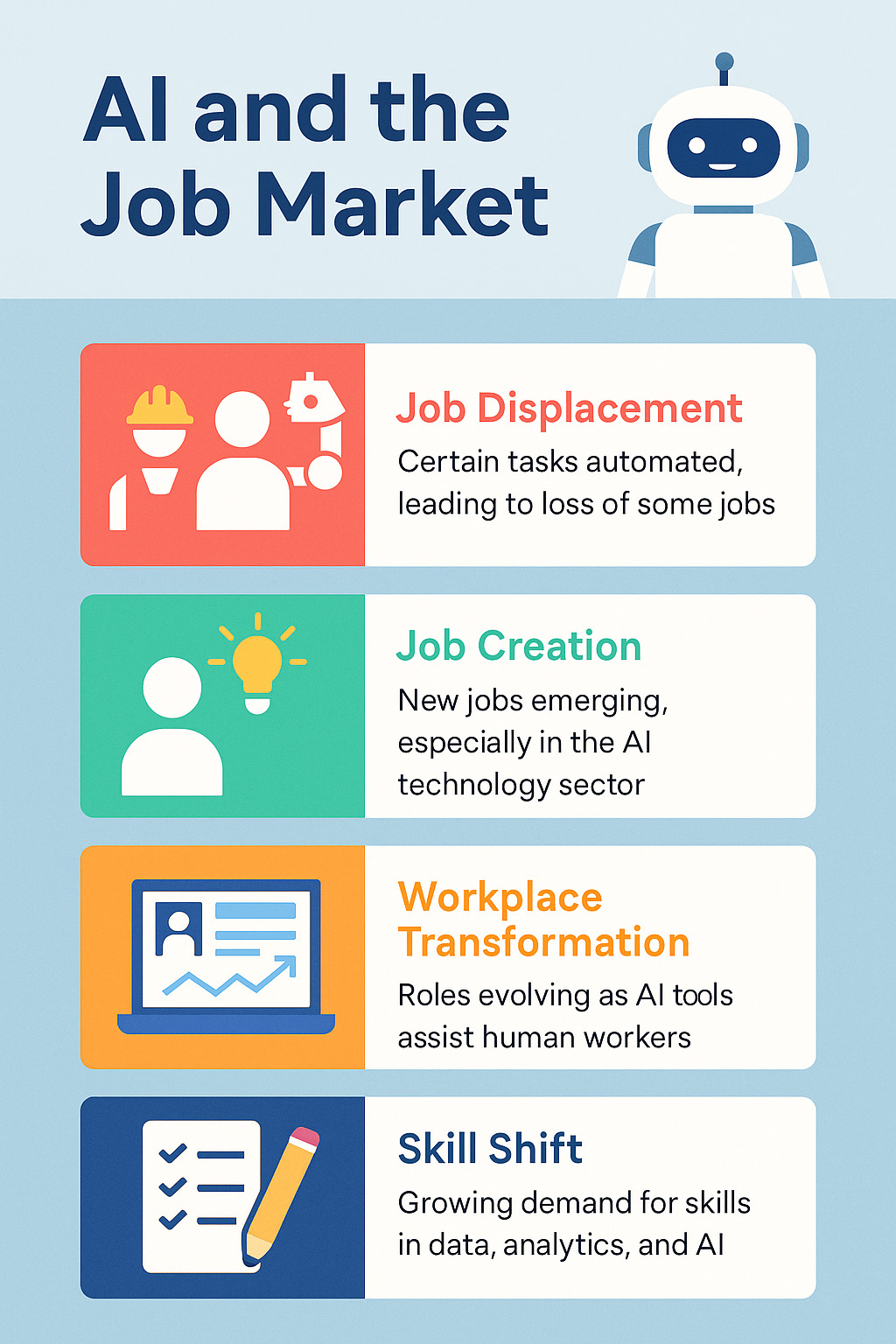Let’s talk about the question that hangs over almost every conversation about artificial intelligence. You’ve probably thought it yourself: “Will AI take my job?”
It’s a fair question — and one that’s been asked at every major technological turning point in history. From the printing press to the personal computer, every breakthrough has sparked the same anxiety.
Here’s the truth: AI will change jobs. Some will evolve. Some will fade. Many new ones will be created. But that doesn’t mean it’s all doom and gloom. In fact, it’s the opposite. AI isn’t coming for your career — it’s coming for your busywork. The repetitive, time‑consuming parts of your job that drain your creativity and steal your time.
Once you understand how to use it, AI doesn’t take your work away — it gives part of your life back.
What Jobs Are Changing (And Which Are Not Disappearing)
AI is already reshaping industries — but not in the ways the headlines make it sound. It’s not replacing people; it’s replacing tasks.
Jobs being reshaped:
- Customer service reps are using AI chat tools to handle routine questions faster.
- Writers, marketers, and designers use AI for drafts and ideas — not to replace creativity, but to multiply it.
- IT professionals and analysts automate reports, monitor systems, and find issues before they happen.
These roles aren’t vanishing — they’re evolving. The people who learn to use AI effectively become the ones everyone turns to.
Jobs staying human:
Anything that depends on empathy, trust, or human connection remains firmly in human hands. Teachers, nurses, therapists, leaders, coaches, creators — this is work that relies on emotional intelligence and can’t be automated. AI can mimic tone, but it can’t replace the warmth of understanding.
The reality is, AI will likely change what your job looks like, not eliminate the need for you. The more you learn to use it, the more valuable you become.
The Adaptability Advantage — How Learning AI Protects Your Future
Adaptability is the new superpower. Every time technology changes, the people who thrive are the ones who stay curious instead of defensive. Learning to work with AI isn’t just a skill — it’s career insurance.
- If you use AI to assist your daily work, you instantly become more productive.
- If you share what you’ve learned with others, you become a leader — even informally.
- If you teach yourself to adapt, no new technology can ever “leave you behind” again.
Personal example: I used to spend hours writing and testing PowerShell scripts, tweaking code, and waiting for results. Now I can describe the goal to AI, have it write and explain the script, and get it running in minutes. What used to take an afternoon now takes two minutes. The result? More time for teaching, writing, and building resources. AI didn’t replace me; it multiplied what I could do.
How to Future‑Proof Your Career: Curiosity, Creativity, and Collaboration
Here’s the good news — the future doesn’t belong to AI. It belongs to humans who know how to use AI. You don’t need to be a data scientist. You just need to be open to learning, experimenting, and adapting.
Curiosity
Ask questions, experiment, and play. Treat AI like a tool to explore ideas, not a threat to avoid. You don’t have to know everything — just be willing to click “try.”
Creativity
AI is a fantastic partner, but it needs your imagination to guide it. Let it handle the groundwork so you can focus on the creative decisions only you can make.
Collaboration
The future of work isn’t “humans vs. machines” — it’s humans with machines. You’ll get the best results when you collaborate with AI instead of competing with it. It’s your assistant, not your rival.
And here’s a big tip after helping many people get comfortable with these tools: the biggest hurdle is fear. Once you get over “I don’t understand this, so it must be dangerous,” everything starts to click. Start small — rewrite an email, summarize a document, or brainstorm ideas. That first success builds confidence.
A Hopeful Reality
Technology has always transformed the way we work — from typewriters to word processors, from filing cabinets to cloud storage. AI is simply the next step in that evolution.
Yes, it will change some jobs. But it will also create new ones focused on creativity, oversight, teaching, and innovation. In fact, many of the most secure careers in the next decade will belong to people who know how to use AI to enhance human work, not replace it.
So no, AI won’t take your job. But someone who knows how to use AI might. That’s why now is the best time to learn. Be curious. Experiment. Play a little. Ask questions. And remember: AI doesn’t reduce your value — it amplifies it.
